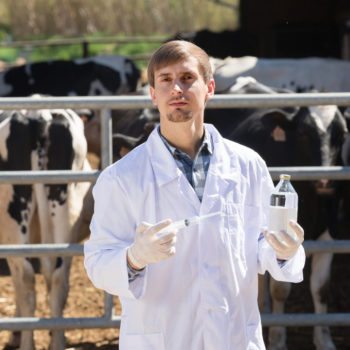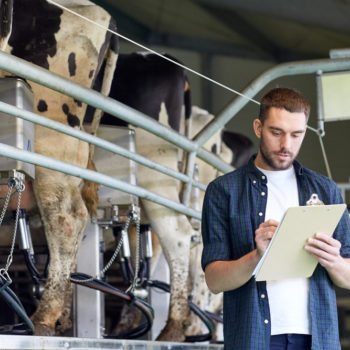Why We Love It
-
$43,810Potential Avg. Salary
-
-0.7%Job Growth Rate
-
Don't Take Work HomeCareer Attribute
-
Get to TravelCareer Attribute
Agricultural inspectors conduct investigations of the facilities, processes, and conditions of food production facilities. Like health inspectors that conduct investigations at restaurants, agricultural inspectors ensure that food produced on farms meets FDA regulations and is safe for consumption.
Recommended Schools
What is an Agricultural Inspector?
The following job responsibilities are common for individuals in agricultural inspector roles:
- Conduct inspections on farms, at food processing plants, and other food production facilities
- Ensure that all equipment, conditions, processes, and environments meet FDA regulations
- Inspect equipment, environments, and processes to identify any risks to safe consumption
- Issue grades to farms and other food production facilities based on adherence to regulations and cleanliness of production areas
- Recommend temporary or permanent closure of facilities that are engaging in practices that represent likely health risks to those who consume its food products
A Day in the Life
If you’ve ever worked in a restaurant or noticed the grade assigned to a restaurant you patronized, you’re likely familiar with the work of health inspectors. Health inspectors investigate food storage and preparation procedures at restaurants to ensure the restaurant is safe for people to eat at. What you might not know, however, is that very similar health inspections occur at farms and other food production facilities. This work is conducted by agricultural inspectors who ensure that equipment, processes, and food handling at major food production facilities meet FDA requirements.
Like restaurants, major food production facilities are assigned a grade by the agricultural inspectors who investigate them. Agricultural inspectors conduct investigations of a variety of conditions at food processing facilities and farms, ensuring that equipment is clean and functional, food is properly stored, and no procedure puts food in contact with elements that put consumers at risk for foodborne illness. They ensure that the food you purchase at the grocery is safe to eat.
When issues are discovered, agricultural inspectors must compile detailed documentation of the issues. This may include taking photographs or writing detailed notes. Issues may result in the food producer receiving a low grade or, in extreme circumstances, having their facilities temporarily shut down until the issue is resolved. In extreme or recurring cases, the agricultural inspector may also make a case for the permanent closure of the facility to prevent mass foodborne illness caused by repeat offenders.
Typical Work Schedule
Agricultural inspector roles are typically full-time jobs conducted during normal business hours. However, agricultural inspectors—depending on the area they oversee—may be require to travel for work at times to conduct investigations of farms and production facilities that are outside their area of residence.
Typical Employers
Agricultural inspectors generally work for federal, state, and local governments, though a small percentage of jobs may be available in other industries. They are commonly hired to work for the Food and Drug Administration (FDA) and similar state and local health inspection agencies.
Recommended Schools
How To Become an Agricultural Inspector
It’s possible to become an agricultural inspector with only a high school diploma, though many employers prefer to hire candidates with bachelor’s degrees. To work your way into the role with only a high school diploma, you’ll need to take entry-level positions in the field and work your way into an agricultural inspector role. Entry-level positions performing administrative functions at local and state health agencies can expose you to the requirements of the role, and over time, you may be able to secure a promotion into an agricultural inspector position.
However, many employers—especially at the state and federal government levels—prefer to hire agricultural inspectors with bachelor’s degrees. Common majors for agricultural inspectors include agricultural science, biology, animal science, or public health. These degrees expose students to topics that will be important in the field, such as proper food care, proper animal care, and federal and state regulations and laws related to food handling and production.
With a degree, you should be able to find internships or agricultural inspector positions in the field. Most employers also provide on-the-job training for new inspectors, so you may spend time at the beginning of your career assisting experienced agricultural inspectors with their responsibilities to gain the knowledge you’ll need to conduct investigations on your own after your training is complete.
Agricultural Inspector Salary Data
We’ve provided you the following to learn more about this career. The salary and growth data on this page comes from recently published Bureau of Labor Statistics data while the recommendations and editorial content are based on our research.
National Anual Salary
Low Range
$32,190Average
$43,810High Range
$62,930National Hourly Wage
Low Range
$15/hrAverage
$21/hrHigh Range
$30/hrHow do Agricultural Inspector salaries stack up to other jobs across the country? Based on the latest jobs data nationwide, Agricultural Inspector's can make an average annual salary of $43,810, or $21 per hour. This makes it an Above Average Salary. On the lower end, they can make $32,190 or $15 per hour, perhaps when just starting out or based on the state you live in.
Salary Rankings And Facts
#472 Nationally for All Careers
Programs and Degrees
Here are the most common degrees for becoming an Agricultural Inspector. a is usually recommended and specifically a degree or coursework that prepares you for the particular field, see below.
Highest Education Among Agricultural Inspectors
- 2.9% Doctorate
- 4.9% Masters
- 30.2% Bachelors
- 7.3% Associates
- 21.4% College
- 26.5% High School
- 6.8% Less than High School
Job Growth Projections and Forecast
2014 Total Jobs
14,2002024 Est. Jobs
14,100Job Growth Rate
-0.7%Est. New Jobs
-100How does Agricultural Inspector job growth stack up to other jobs across the country? By 2024, there will be a change of -100 jobs for a total of 14,100 people employed in the career nationwide. This is a -0.7% change in growth over the next ten years, giving the career a growth rate nationwide of Below Average.
Growth Rankings And Facts
#631 Nationally for All Careers
What Companies Employ The Most Agricultural Inspectors
| Industry | Current Jobs | New Jobs Needed | % Increase |
|---|---|---|---|
| Federal government, excluding postal service | 5,100 | -500 | -1% |
| State government, excluding education and hospitals | 4,700 | 100 | 0% |
| Animal slaughtering and processing | 800 | --- | --- |

















